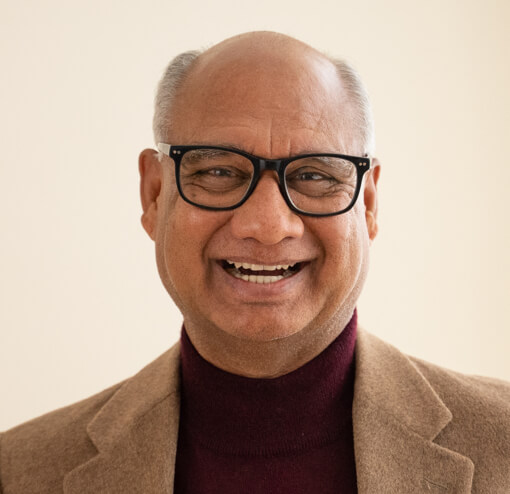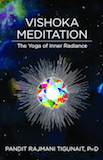A tale told and retold in India for thousands of years gives us a glimpse of the scope of meditation and its transformative power. This is the story of Dhruva, a young man born and raised in an extremely dysfunctional family. Yet Dhruva went on to become a legendary ruler whose name is associated with inner stability, indomitable will, courage, clarity, enthusiasm, and lasting happiness.
Dhruva’s father was a king with two wives. Dhruva was the son of the first wife, who came from a kingdom of moderate power, wealth, and influence. She was humble, kind, and somewhat innocent. But the second wife, Dhruva’s stepmother, was beautiful, proud, and ambitious. She came from a powerful royal family and exerted enormous influence on her husband and his courtiers.
Having subdued her husband, the second queen accumulated power and basked in the glamour that accompanies a sovereign. But Dhruva’s presence haunted her. He was the first son of the king’s first wife and, according to the law of the land, was the king’s rightful heir. The second queen’s hunger for power, prestige, and attention grew until she found the presence of Dhruva and his mother intolerable. By creating scandalous rumors and feeding them skillfully, she turned the king, his courtiers, and everyone else against the pair and soon succeeded in ousting them from the palace.
She made sure that life was more painful than death.
But the misery she inflicted on Dhruva and his mother did not end with depriving them of their home. She made sure that the life of the homeless pair was more painful than death. Fearing her wrath, the king’s subjects denied mother and son shelter and food. Deprivation and humiliation became a way of life.
What could be worse for a mother than watching helplessly as her son is humiliated? What could be worse for a son than not being able to do anything when his mother is insulted before his eyes? How intensely painful it must have been for the young prince, who knew he was the rightful heir to the kingdom, to be treated worse than a stray dog by his own people. How can someone in such a situation be free from the torments of animosity and revenge? How can someone who has been betrayed by his own father ever trust anyone? How can a person drowning in a bottomless sea of dejection and sorrow retain any love for life? Caught in a whirlpool of misery and not knowing what else to do, the young man quietly abandoned his mother and vanished.
Meanwhile Narada, one of the most revered masters of his time, visited the kingdom. Narada had been Dhruva’s grandfather’s best friend. He heard about the nasty dynamics in the palace and the misery that weighed on the young prince so heavily that he had shut himself off from his only remaining source of hope, his own mother. Deeply moved, Narada set out to search for Dhruva. Eventually, he found him roaming aimlessly in a part of the forest where no human dared enter unprotected, a sure sign that the young man had lost his will to live.

Dhruva recognized Narada immediately, and this unexpected encounter opened a floodgate of childhood memories. He remembered his grandfather and a palace abounding in love, care, and nurturance, and he remembered what had transpired after his grandfather died. For his part, Narada saw this grief-stricken man from inside out. He saw how decrepit Dhruva had become—his youthful vibrancy had been almost completely consumed by his lack of trust in himself, trust in his kinsmen, trust in providence, and trust in truth and justice.
Narada was determined to help Dhruva shake off his sorrow and grief and reclaim the power he needed to become happy and self-trusting once more. The sage knew this was a delicate matter. The young man was weak and had become frail. He had nowhere to live and nothing to eat. His heart was shrunken and his mind scattered. But worst of all, he had lost hope.
This young man first needed assurance that someone loved him.
Narada knew that this young man first needed assurance that someone loved him. He must realize he was not alone so he could regain a sense of belongingness. He must also reclaim his physical vitality and mental clarity. Narada knew that because the emotional injuries caused by his family and the rest of the world were so fresh, it was too early to talk about discovering the deeper causes of his afflictions. The first step was to help this young man restore his sense of normalcy. Only then would it be possible to inspire him to discover the tools and means to find and conquer all adversaries, including those that are hardest to defeat—fear, doubt, anger, enmity, and regret. The methodology Narada used to help Dhruva achieve this goal came to be known as Vishoka Meditation.
Narada led the young prince through a process that enabled him to replenish his body and restore the balance of his mind. He taught Dhruva how to protect his mind from the emotional storms arising from deep-rooted afflicting memories. He taught him breathing techniques for healing his mind, heart, and body, and for restoring his internal ecology.

This breath-driven quest brought Dhruva to a point where he could stop his mind from spinning and allow it to become still. From that place of stillness he was able to see the subtle cause of his fear, anger, sorrow, and grief. He saw clearly that his father and stepmother were simply the triggers, not the actual cause. With this awareness he could now easily erase the long list of complaints his mind had been nurturing. This gave him great comfort, for now he realized that he did not need to beg the world to grant him justice. He did not need his family, friends, or anyone else to assure him that he was safe from his adversaries. Free from fear, doubt, anger, enmity, grief, and hopelessness, he now understood he had the ability to create his own destiny.
The scriptures tell us that it took six months for Dhruva to move from utter despair to complete stillness. As soon as he stopped fighting his inner enemies, the process of reconciliation at home began. His father and stepmother recognized their folly. They made every attempt to bring Dhruva back to the palace, but he stayed firm in his resolve to make himself stronger, clearer, and independently happy. The prospect of reclaiming the love, respect, power, and dignity he rightfully deserved was not as alluring as discovering how freedom from inner conflict resolves conflicts in the external world. He continued the practice and eventually reached the place in his own heart that abounds with supernal bliss. He recognized that the state of consciousness infused with this bliss is the pure being, the eternal self.
Constant awareness of this reality enables us to navigate all calamities joyfully.
Dhruva realized this is the very axis of existence. The world of pleasure and pain, gain and loss, honor and insult, victory and defeat, and even birth and death revolves around it, as does every event and every experience. He understood that constant awareness of this reality enables us to navigate all calamities joyfully. There is no greater achievement than finding and retaining our connection with this reality. It is only when we are disconnected from this pure being that our relationships with our friends and foes become confusing. All quests and conquests begin from here. All commotions and defeats begin in the absence of this connection.
Dhruva’s story concludes with an extraordinary experience—he rose above his physical and mental level of awareness and was totally absorbed in the collective consciousness of the universe. The wall that separates an individual from the universal self collapsed. He was the world and the world was him. Past, present, and future became a continuum. Mundane and sacred were no longer separate. Dhruva saw creation as an extension of its creator. This experience was so thrilling that the subtle thread of his breath came to a complete halt.
Because this spontaneous breath retention occurred when the world had become an integral part of Dhruva’s consciousness, the breath of life in the entire world ceased. All living beings began to suffocate. The forces of nature and high-caliber souls and divinities petitioned the creator to bring Dhruva back to normal consciousness so living beings could regain their breath. Thus Vishnu, the all-pervading creator and protector of all, pulled Dhruva from this profound meditative state and blessed him with the highest degree of power, prestige, honor, wisdom, stability, and endurance. During his life he ruled the earth. At death he was awarded immortality and shines in the night sky as Polaris, the North Star. Thus, in Indian astrology, the name for the pole star is Dhruva.
Like Dhruva’s journey, Vishoka Meditation begins with the right understanding of pain and sorrow and ends with lasting joy and fulfillment. The sizeable gap between where it begins and where it ends is filled with a series of techniques and practices designed to help us overcome our weaknesses and reclaim our innate strength.
Source: Vishoka Meditation: The Yoga of Inner Radiance by Pandit Rajmani Tigunait

